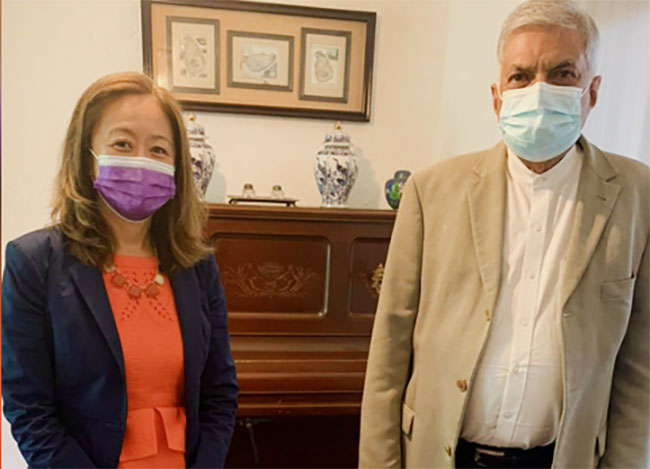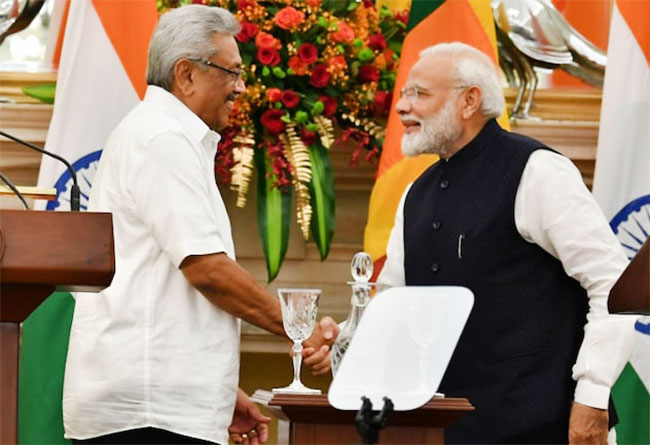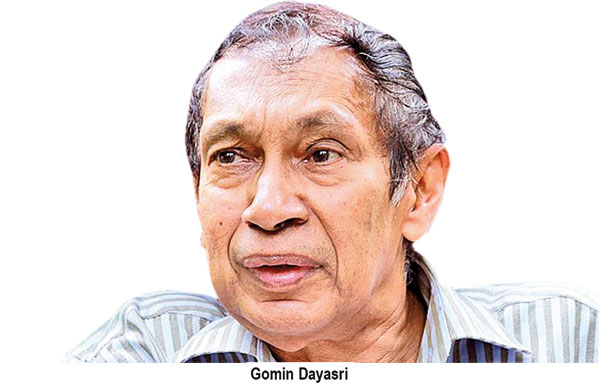SPECIAL REPORT : Part 428
US Ambassador of Korean extract Chung tweeted Friday July 22 evening that she had expressed grave concern over the ‘unnecessary and deeply troubling escalation of violence against protestors overnight’. “The President and Cabinet have an opportunity and an obligation to respond to the calls of Sri Lankans for a better future. This is not the time to crack down on citizens, but instead to look ahead at the immediate and tangible steps the government can take to regain the trust of the people, restore stability, and rebuild the economy”, Chung said. During the discussion with Ambassador Chung, President Wickemesinghe is reported to have compared the seizure of the Presidential Secretariat with that of the January 06, 2021 attack on the US Capitol at a time the joint session of the US Congress was underway to affirm Joe Biden’s victory. President Wickremesinghe is also believed to have reminded that no one bothered to issue tweets when his private residence was set ablaze by a violent mob on the night of July 09. They even prevented the fire engines from reaching the site to put out the fire.
By Shamindra Ferdinando
Uncompromising ardent nationalist and Sri Lanka’s former Ambassador to Myanmar Prof. Nalin de Silva has compared President Ranil Wickremesinghe’s actions with that of late President Ranasinghe Premadasa and President Mahinda Rajapaksa.
In an online article written in Sinhala and posted on July 23, the retired university mathematics don dealt with President Wickremesinghe, the Parliament and Western envoys.
Towards the end of a short piece, Prof. de Silva made reference to President Wickremesinghe’s directive to the police and armed forces to clear the Presidential Secretariat (old parliament) of protesters. The newly elected President’s no-time-to-waste move drew angry reactions from Western embassies, local and international NGOs as well as by civil society groups, mainly dependent on Western funding. They conveniently didn’t bother to acknowledge that the Galle Face protest site remained, though those who blocked the Presidential Secretariat were removed for the new President to get down to work from the rightful place.
President Wickremesinghe immediately called for a meeting with those envoys who raised concerns at his office where he briefed them. Top presidential aide Sagala Ratnayake sat next to the President. The new leader didn’t mince his words when he strongly defended the action taken by the military and the police on his directives to begin restoring order in the country, overrun by violent mobs, who often posed off as non-partisan peaceful protesters, despite JVP leaders and some members of the breakaway faction, the Frontline Socialist Party (FSP), openly saying that they were behind the protests, especially at the nerve centre at Galle Face.
Prof. de Silva equated President Wickremesinghe’s response to Western governments’ criticism of late President Ranasinghe Premadasa and President Mahinda Rajapaksa over their actions in response to British High Commissioner David Gladstone and French Foreign Minister Bernard Kouchner and his British counterpart David Miliband, respectively.
Gladstone served as the UK’s High Commissioner in Colombo from 1987 to 1991. An angry President Premadasa declared Gladstone persona non grata over him lodging a complaint with the police over election violence in the Dickwella electorate at the Local Government election conducted on May 10, 1991. President Premadasa ordered Gladstone out after his efforts to persuade London to recall its man failed. Gladstone departed a few days before the LTTE assassinated one-time Indian Premier Rajiv Gandhi on May 21, 1991, at Sriperumbudur in Tamil Nadu.
President Mahinda Rajapaksa without cowing down to Western pressure flatly denied a joint British–French call for an immediate ceasefire as the combined security forces thrusts were in the process of encircling the LTTE remnants, trapped in the Mullaithivu district. The President made his position clear after both Miliband and Kouchner went all the way down to meet him at remote Chandrikawewa, Embilipitiya, on April 29, 2009.
President Rajapaksa’s military brought the war to a successful conclusion on the banks of the Nanthikadal lagoon on May 19, 2009.
Appreciating how President Mahinda Rajapaksa asked Westerners to keep out of the war against separatist terrorists, academic de Silva asserted that in case Matara District parliamentarian Dullas Alahapperuma won the
Presidential contest, the protesters would have been still in control of government buildings seized by them on July 09. The former Ambassador alleged that the protesters would have had the backing of Western governments and India.
The ardent nationalist said that an assessment on President Wickremesinghe couldn’t be made on the basis of one incident.
Prof. de Silva quit the ambassadorial position in mid-September 2021, a posting he received courtesy the Sri Lanka Podujana Peramuna (SLPP) administration despite being a maverick all his life when it came to the national interest. He presented the Letter of Credence to Myanmar President Win Myint on 01 Sept. 2020 at the Presidential palace in Nay Pyi Taw.
Though a strong critic of Wickremesinghe and those considered Western elitists in the past, the former envoy asserted that there would have been a catastrophe if the Parliament didn’t elect the five time PM as the President. UNP
Leader Wickremesinghe secured 134 votes against Alahapperuma 82. JVP leader Anura Kumara Dissanayake came in a distant third with just three votes.
Lambasting the group that had backed Alahapperuma, Prof. de Silva strongly defended the Parliament for its endorsement of Wickremesinghe. The academic dismissed the much touted claim by interested parties that the current Parliament didn’t reflect the opinion of the electorate. The outspoken activist emphasized that it wouldn’t be realistic to expect lawmakers to consult the electorate as regards decisions taken at such a critical juncture, when mob rule was about to get established.
The President’s Media Division (PMD) quoted President Wickremesinghe as having told Western envoys that both Article 21 of the International Covenant on Civil and Political Rights, and Article 14 (1) (b) of the Constitution of Sri Lanka, which governed the rights of peaceful assembly, would be upheld by the Government.
The President also explained that the instructions given by the American Civil Liberties Union stated that protesters were not permitted to block government buildings and interfere with other purposes the property was designed for.
Unfortunately, the UNP leader didn’t say so before those who converged in Colombo since April 09 with overwhelming reinforcements paid for by hidden hands with deep pockets, finally overran the President’s House, Temple Trees and the Presidential Secretariat.
The declarations made by National Freedom Front (NFF) Leader Wimal Weerawansa, in Parliament, and former General Secretary of the Communist Party DEW Gunasekera that US Ambassador in Colombo Julie Chung interfered in an operation planned by President Gotabaya Rajapaksa’s government cannot be simply forgotten.
President Wickremesinghe has pointed out to these blind critics that contrary to their claims ‘Gotagogama’ hasn’t been removed as alleged by various parties.
Stability and uncertainty
Former President Gotabaya Rajapaksa never addressed the threat posed by the public protest movement. The previous government lacked a cohesive strategy to meet the daunting challenge. However, the government’s pathetic failure should be examined, taking into consideration a long list of disasters caused by its actions and inactions. The government never comprehended that the public protest movement drew its strength from those badly affected by the economic downturn. Instead of addressing economic issues, the previous government badly handicapped by financial constraints played politics with the issues at hand until it was too late.
The UNP that backed the protest campaign received an unexpected opportunity to secure the presidency, courtesy of the ‘Gotagogama’ campaign.
In hindsight, the crises that ultimately compelled Gotabaya Rajapaksa, the wartime Defence Secretary who secured nearly seven million votes at the 2019 presidential election, to flee the country in the early hours of July 13, 2022, couldn’t have been dealt with security measures alone. Obviously the security setup rapidly deteriorated since the March 31, 2022, attempt to storm his private residence, instigated by an organized gang, to such an extent all overland routes to Colombo remained opened in spite of the protest movement vowing to oust President Gotabaya Rajapaksa on July 09 with courts refusing to issue injunctions to stop such acts.
There had never been an attempt to estimate the strength of the growing movement. Those who blamed various interested parties, including the Tamil Diaspora and Western embassies of fomenting the public against the government never bothered to acknowledge their own blunders that created an army of angry youth.
Now, President Wickremesinghe has sought to reassert government authority, while acknowledging the right of the protest movement to continue its struggle, albeit without violence.
Ironically Samagi Jana Balavegaya (SJB) leader Sajith Premadasa, who had been targeted by the protesters on May 09 at Galle Face, was among those who issued statements condemning President Wickremesinghe’s actions. Can President Wickremesinghe’s actions be compared with the unleashing of a goon attack on the Galle Face protesters from Temple Trees by some of those who came to bid farewell to then PM Mahinda Rajapaksa?
Police headquarters issued a detailed statement on the situation leading to the clearing of protesters and the situation thereafter. However, the police should respond to protesters’ claims that the military moved in regardless of their announcement to vacate the environs of the Presidential Secretariat. Perhaps, the government should have waited a little longer before deploying the military. It would also be pertinent to mention that repeated attempts by the police to persuade the protesters to vacate those places had been ignored and law enforcement officers were repeatedly humiliated for the public to see. The police released video footage of such an encounter between the police and protesters, which were earlier posted on social media obviously by those backing the protesters.
There is no doubt we cannot allow mob rule to destroy this country and early restoration of stability largely depends on tangible measures taken by the new administration to rebuild the economy. It would be a grave mistake on the part of the political parties represented in Parliament to prioritize constitutional and electoral reforms at the expense of the financial sector. Ugly confrontations between the government and the Opposition in Parliament and street battles would not in any way help rebuild the economy. Let there be a ceasefire on all fronts until the executive, the legislature and the judiciary address the issues at hand.
The Opposition, particularly those who voted for lawmaker Alahapperuma at the presidential contest should realize that further destabilization wouldn’t benefit the already deeply wounded country at all.
Foreign projects
Foreign governments shrewdly exploited situations here to pressure post-war Sri Lanka. Wartime disappearances and the Colombo Swiss Embassy drama staged in Nov 2019 can be cited as two such issues.
The latter was meant to humiliate Gotabaya Rajapaksa in the immediate aftermath of his magnificent victory over UNP candidate Sajith Premadasa at the presidential election.
The Swiss project received the backing of Western missions before the government exposed it. Peter Hans Mock, the then Swiss Ambassador here made a desperate bid to make the trumped up allegation stick. Then US Ambassador Alaina Teplitz was among those envoys who questioned Sri Lanka’s right to challenge the Swiss allegation. Teplitz went to the extent of taking up the issue with popularly elected President Gotabaya Rajapaksa, the real Swiss target.
It would be pertinent to discuss Wickremesinghe’s response to wartime disappearances when he served as Prime Minister of the yahapalana administration.
The 2015 presidential election brought an end to the war-winning President Mahinda Rajapaksa’s rule. The Rajapaksa administration was repeatedly accused of running secret detention facilities, both in the Northern and Eastern provinces. A section of the Western powers, too, subscribed to these unsubstantiated allegations. In spite of the change of the government, in 2015, accusations persisted.
In the run-up to the 2015 Geneva sessions, Sri Lanka was repeatedly accused of still operating secret detention facilities. In the then administration Maithripala Sirisena served as the President whereas UNP leader Wickremesinghe held the post of the Prime Minister.
In 2015, Sri Lanka agreed to set up (I) a judicial mechanism with a Special Counsel to investigate allegations of violations and abuses of human rights and violations of international human rights law, (II) a Commission on truth, justice, reconciliation and non-recurrence, (III) an Office on missing, and (IV) an office for reparations.
In the run-up to the Geneva sessions, Premier Wickremesinghe set the record straight, at a ceremony at Rukmale Sri Dharmaloka Vijayaloka Maha Viharaya, on March 01, 2015, to felicitate the newly appointed Maha Nayaka Thera Ven. Ittapane Dharmalankara. Among those present was Malcolm Cardinal Ranjith, Archbishop of Colombo.
Premier Wickremesinghe declared that as all those who had been taken into custody, during the war and the post-conflict period, were being held in legally run facilities, all detainees/prisoners could be accounted for. The UNP leader didn’t mince his words when he emphasized that those missing, but not listed among those in government custody, had either perished during the conflict or were living overseas ‘(Prime Minister denies existence of secret detention camps’. with the strap line ‘Those not among prison population either perished during the war or living overseas’- The Island March 04, 2015.)
A couple of days later, Premier Wickremesinghe challenged the much-touted UN claim of over 40,000 civilians killed on the Vanni east front, in 2009. Wickremesinghe also stressed the urgent need to verify the UN claims, as well as various other accusations. Unfortunately, Wickremesinghe did nothing. In spite of countering allegations, his government conveniently failed to bring the issues to a successful conclusion. Wickremesinghe’s handling of the post-war accountability issue, too, contributed to the humiliating defeat his party suffered at national level elections.
More than seven decades old, the UNP ended up without a single elected MP. The party filled its National List slot in June 2021 with the nomination of its leader Ranil Wickremesinghe.
The UNP leader Wickremesinghe however clearly indicated in an exclusive interview with the Indian Thanthi TV in which he insisted that figures, quoted by the UN or other organizations, couldn’t be accepted without being verified. The March 6, 2015, interview couldn’t have been conducted at a better time, though Wickremesinghe did nothing subsequently to examine the Vanni death toll. Instead, Wickremesinghe gave the then Foreign Minister late Mangala Samaraweera the go ahead to co -sponsor the accountability resolution, in Geneva, on Oct 01, 2015. The rest is history.
When the interviewer, S.A. Hariharan, pointed out that the Tamil Diaspora had estimated the number of civilian deaths closer to 100,000, Wickremesinghe asserted that it wouldn’t even come up to 40,000. Wickremesinghe pointed out that, in addition to the PoE (Panel of Experts) report, there had been other official reports that dealt with accountability issues. The Premier emphasized the pivotal importance of verifying such accusations to establish the number of civilian deaths.
The Premier said that some official reports placed the number of civilian deaths at 5,000. The UNP leader however never called for the verification of the UN report until he was humiliatingly turned out of parliament by the electorate at the last general election.
In spite of underlining the importance of verifying accusations, Wickremesinghe didn’t take any follow-up action. The Sirisena-Wickremesinghe government conveniently refrained from using heavy ammunition in our rightful defence, provided by Lord Naseby, in Oct 2017, to counter the PoE report. The Gotabaya Rajapaksa government, too, never formulated a cohesive strategy to use Lord Naseby’s bombshell disclosure.
Now, Wickremesinghe, who re-entered Parliament in late June 2021, 10 months after the last general election, is at the helm. As the President, Wickremesinghe has been compelled to face Western criticism. In a way, the Western reaction to the clearing of protesters blocking the entrance to the Presidential Secretariat can be compared with the staged Swiss Embassy drama soon after President Gotabaya Rajapaksa was elected with a record majority to tarnish his image.


